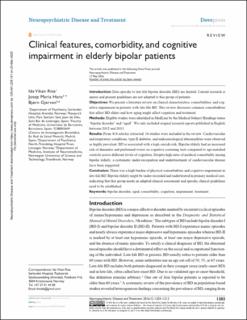Clinical features, comorbidity, and cognitive impairment in elderly bipolar patients
Peer reviewed, Journal article
Published version

Åpne
Permanent lenke
https://hdl.handle.net/11250/2648518Utgivelsesdato
2016Metadata
Vis full innførselSamlinger
- Institutt for psykisk helse [1216]
- Publikasjoner fra CRIStin - NTNU [37703]
Sammendrag
Introduction: Data specific to late-life bipolar disorder (BD) are limited. Current research is sparse and present guidelines are not adapted to this group of patients.
Objectives: We present a literature review on clinical characteristics, comorbidities, and cognitive impairment in patients with late-life BD. This review discusses common comorbidities that affect BD elders and how aging might affect cognition and treatment.
Methods: Eligible studies were identified in MedLine by the Medical Subject Headings terms “bipolar disorder” and “aged”. We only included original research reports published in English between 2012 and 2015.
Results: From 414 articles extracted, 16 studies were included in the review. Cardiovascular and respiratory conditions, type II diabetes, and endocrinological abnormalities were observed as highly prevalent. BD is associated with a high suicide risk. Bipolar elderly had an increased risk of dementia and performed worse on cognitive screening tests compared to age-matched controls across different levels of cognition. Despite high rates of medical comorbidity among bipolar elderly, a systematic under-recognition and undertreatment of cardiovascular disease have been suggested.
Conclusion: There was a high burden of physical comorbidities and cognitive impairment in late-life BD. Bipolar elderly might be under-recorded and undertreated in primary medical care, indicating that this group needs an adapted clinical assessment and specific clinical guidelines need to be established.
